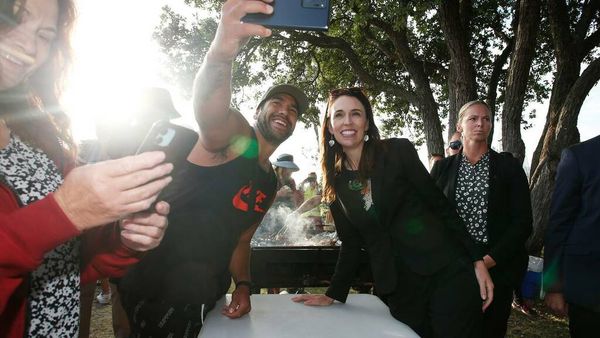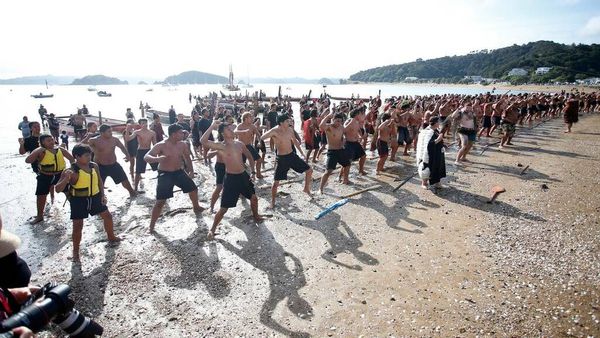
On the 182nd anniversary of the signing of Aotearoa New Zealand’s founding document, the Waitangi Treaty grounds – usually thronging with tens of thousands of people – were quiet and cloaked in a gloss of rain, a sign, or tohu, to some that it is a Waitangi Day like no other.
National events were cancelled this year, and ceremonies, speeches and reflections moved online, as the country teeters on the edge of a widespread Omicron outbreak.
In previous years, the day begins with a dawn service, where Māori leaders, members of parliament, religious leaders, officials and countless others gather in darkness to join together in waiata (song) and prayer. Then follow speeches, live music, and a barbecue served up by the prime minister, Jacinda Ardern, and members of her Labour party. Roughly 40,000 people attend the celebration each year, under a blazing summer sun.
Today, under drizzly, subdued, skies, just 200 people gathered on the shoreline below Ti Tii Marae, to watch waka taua – war canoes – paddle to the shore.
Pita Tipene, chairman of the Waitangi National Trust Board, said the morning was surreal without the usual crowds. Tipene held his own karakia (prayer) early in the morning, with his mokopuna (grandchildren). He stood at the marae (meeting house) and looked across the empty grounds, where he would usually see people standing shoulder-to-shoulder, and likened it to a forest without birdsong or cicadas.
“The interaction, and the discourse, and discussion and debate and the buzz of the people – it is very similar to being in a forest with the bird song – [without it] something’s not quite right. In this case, it’s Covid being amongst us all, and the decision that was made to ensure the safety and welfare of everybody.”

Tipene commented on the rain falling across much of the North Island, and said that in his memory, he has never attended a Waitangi Day where it had poured down.
“That in itself is a tohu, a sign,” he said, adding that he sees the rain on Waitangi, which translates to “weeping water”, as a positive sign for reflection and change. “It’s time to set this nation on the course that was envisioned by our tupuna [ancestors], when they signed it 182 years ago.”
That includes looking towards the treaty’s bicentennial in 18 years. “I’m encouraging all leaders, including political leaders, to start having, in a very purposeful way, conversations about what nationhood means and what are some tangible symbols could be brought to Waitangi and other parts of the country for 2040.”
Treaty ‘compels us to consider and respect our differences’
In a pre-recorded address, Ardern said while people cannot come together on the treaty grounds, “the day remains of great importance to us as a nation”.
“In previous speeches you have heard me use the metaphor that ‘Aotearoa will always have clouds’, to represent the challenges we need to overcome today and into the future.
“How we need to continue to use every opportunity to cross the bridge, te arawhiti, and join our two worlds. And how we need to work in partnership to improve outcomes for Māori, and for all New Zealanders.
“While we always have more work to do – the mahi never ends – it is important to take time and reflect.”
Ardern reflected on some of the year’s milestones – New Zealand’s pandemic response, which led to some of the best health outcomes in the world; a new school curriculum that will include the teaching of New Zealand history; and 2022 becoming the first year where Matariki, the Māori new year celebration, will be honoured as a public holiday.
But she acknowledged the government still had a way to go in turning around poverty, housing inequality and poor health outcomes for Māori. “If we are to make progress as a nation, we have to be willing to question practices that have resulted over and over in the same or even worse outcomes,” Ardern said.
“What we all want by and large for our people is the same. The same chance to fulfil our potential. To live decent lives. To make decisions for ourselves. How we get there will differ. That is partnership. That is building the bridge.”
The Treaty of Waitangi, Te Tiriti o Waitangi, was signed by Māori chiefs and the British Crown in 1840, and has been commemorated as a public holiday since 1974 – for two years as “New Zealand Day” before reverting to the name of the foundational treaty. It has often been the scene of demonstrations, with Māori protesting against the lack of progress made in tackling inequality and ongoing breaches of the treaty.

In Ardern’s first Waitangi Day address in 2018, she urged Māori to continue holding the government to account. Last year the Waitangi Tribunal ruled that the government had breached the treaty by giving little heed to the needs of Māori in its pandemic response. Tipene said the government had not yet been held to account on some matters, but added that it was, compared with many previous governments, more open to conversation and debate.
Governor general Dame Cindy Kiro, the first Māori woman to hold the title, used her first Waitangi Day address to acknowledge the many sacrifices New Zealanders had made throughout the pandemic and to thank those who have borne the burden of keeping the country safe.
“Covid-19 has again reminded us of the burdens and privileges of citizenship: the duty of care and respect we share as New Zealanders. That was also the message handed down to us by our forefathers who signed Te Tiriti o Waitangi. It is our nation’s great leveller – a moral and social contract that binds us all equally.”
Kiro likened the treaty to a “sacred covenant of marriage”. “The vows made at the outset do not end there. Rather, those vows provide the foundation of a lasting commitment.
“Throughout our history, we have not always done right by the commitment made by our ancestors 182 years ago. And while we cannot change our past, we can draw wisdom from it. We can see the treaty, not as a burden, but as a gift, because it compels us to consider and respect our differences, and to match virtuous ideals with courageous action.”










